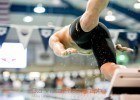How to Strength Train on the Pool Deck
No Weight Room? No Problem! Let’s discuss all the equipment and tools you may need to execute proper strength training on the pool deck.
4 Tips for Easier Summer Swim Meet Travel
Summer meets can be long and your amount of travel can quickly add up. Elite athletes respond to these circumstances by staying consistent with their routines and continuing to treat their bodies well with healthy choices on the road.
How To Blast Better Breakouts In Swimming
The fastest part of your swim is the first underwater following the dive. The next fastest part is your underwater following the turn. How good your breakouts are determines how much of that speed you can carry into the swim.
3 Steps to Overnight Swim Meet Recovery
From the moment finals end until prelims begin the next morning, you have the greatest opportunity to maximize your recovery. Knowing how to take control of those 12-16 hours away from the pool will help you perform at your best throughout the meet.
How to Recover Between Races
Proper race recovery strategies maximize a swimmer’s ability to perform well in multiple races and on multiple days at a meet. These strategies are perfected throughout the year, so when the competition comes around they are an integrated and expected component of the athlete’s routine.
4 Steps to Effective Goal Setting
As the long course season begins, it is a great time to take a look at the big picture: what do you want to accomplish in the next year and what steps can you take to get there?
Race Details: 3 Ways to Improve your Start
At the end of your season, all the training is in the bag, and you are shaved, tapered, and ready to race. Perfecting your race details, such as starts, turns, and breakouts, will give you the best shot at making finals, finishing first, or hitting a qualifying time.
How to Maintain a Strong Core
Swimmers use their core in every part of a race—from the propulsive undulation of dolphin kicking to the quick change of direction on a turn. Maintaining a strong core is an important part of the athlete’s strength training.
3 Ways to Stay Hydrated this Summer
With summer fast approaching, proper hydration will be extremely beneficial to your training. Many athletes remember to drink fluids during practice, but may forget to hydrate outside of the pool.
How to Prepare for Long Course Season
The long course season is considerably shorter than the short course season, making the integrity of your training and meet preparation even more critical.
How to Sleep your Way to A Better Morning Swim Practice
Sleep is of paramount importance to any athlete’s training, but swimmers in particular must be able to train well in the early hours of the morning on a regular basis. Waking up at 5 a.m. (or even 4 a.m.) can throw your training off if you haven’t had enough shut-eye.
3 Steps to Faster Turns
Turns are an incredible advantage to the athlete who can nail them. A great turn will increase your acceleration coming off the wall, giving you “easy speed” that requires no additional effort, whereas a bad turn will make you fight hard to make up for lost ground.
How to Improve your Flexibility
Flexibility is an important part of every swimmer’s training, but it is often overlooked. Not only does flexibility improve your range of motion, but it also protects against injury. Let’s discuss a few ways you can improve your flexibility within your training to improve your athleticism in the water.
3 Ways to Maintain your Strength In Swimming
Staying in better shape by maintaining your strength from one season to the next will help you manage preseason training better and set you up for a great training cycle. Let’s discuss three ways you can maintain your strength over the course of your break.
Swimmers, Sweat, and Why You Need Electrolytes
In the water, the obvious indicators of dehydration are less apparent—excessive sweating, dry mouth, overheating, etc., so it’s easy to forget to drink fluids steadily throughout practice.














